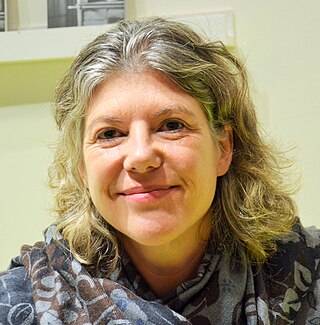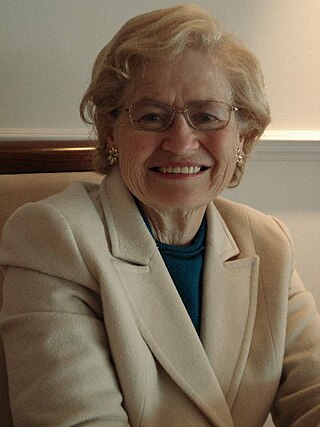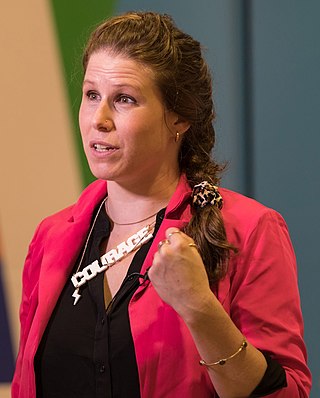
Joseph Eugene Stiglitz is an American New Keynesian economist, a public policy analyst, and a full professor at Columbia University. He is a recipient of the Nobel Memorial Prize in Economic Sciences (2001) and the John Bates Clark Medal (1979). He is a former senior vice president and chief economist of the World Bank. He is also a former member and chairman of the Council of Economic Advisers. He is known for his support for the Georgist public finance theory and for his critical view of the management of globalization, of laissez-faire economists, and of international institutions such as the International Monetary Fund and the World Bank.

Christopher Murray Paul Huhne is a British energy and climate change consultant, and former journalist, business economist and politician who was the Liberal Democrat Member of Parliament for Eastleigh from 2005 to 2013 and the Secretary of State for Energy and Climate Change from 2010 to 2012. He is currently chair of the UK green gas association – the Anaerobic Digestion and Bioresources Association – and senior adviser to the World Biogas Association. He also advises companies on his particular interest in renewable technologies that can provide back up for intermittent energy sources like wind and solar.
William Harold Greider was an American journalist and author who wrote primarily about economics.

John Henry Lanchester is a British journalist and novelist.

Ann Pettifor is a British economist who advises governments and organisations. She has published several books. Her work focuses on the global financial system, sovereign debt restructuring, international finance and sustainable development. Pettifor is best known for correctly predicting the financial crisis of 2007–08. She was one of the leaders of the Jubilee 2000 debt cancellation campaign.

Hon. Andrew John Glyn was an English economist, University Lecturer in Economics at the University of Oxford and Fellow and Tutor in Economics in Corpus Christi College. A Marxian economist, his research interests focused on issues of unemployment and inequality.

Sigrid Maria Elisabet Rausing is a Swedish philanthropist, anthropologist and publisher. She is the founder of the Sigrid Rausing Trust, one of the United Kingdom's largest philanthropic foundations, and owner of Granta magazine and Granta Books.

Julian Baggini is a philosopher, journalist and the author of over 20 books about philosophy written for a general audience. He is co-founder of The Philosophers' Magazine and has written for numerous international newspapers and magazines. In addition to writing on the subject of philosophy he has also written books on atheism, secularism and the nature of national identity. He is a patron of Humanists UK.

Following the global 2007–2008 financial crisis, there was a worldwide resurgence of interest in Keynesian economics among prominent economists and policy makers. This included discussions and implementation of economic policies in accordance with the recommendations made by John Maynard Keynes in response to the Great Depression of the 1930s, most especially fiscal stimulus and expansionary monetary policy.

Dambisa Felicia Moyo, Baroness Moyo is a Zambian-born economist and author, known for her analysis of macroeconomics and global affairs. She has written five books, including four New York Times bestsellers: Dead Aid: Why Aid Is Not Working and How There Is a Better Way for Africa (2009), How the West Was Lost: Fifty Years of Economic Folly – And the Stark Choices that Lie Ahead (2011), Winner Take All: China's Race for Resources and What It Means for the World (2012), Edge of Chaos: Why Democracy Is Failing to Deliver Economic Growth – and How to Fix It (2018), and How Boards Work: And How They Can Work Better in a Chaotic World (2021).

Rachel Jane Reeves is a British politician and economist serving as Shadow Chancellor of the Exchequer since 2021. A member of the Labour Party, she has been Member of Parliament for Leeds West since 2010.

Carmen M. Reinhart is a Cuban-American economist and the Minos A. Zombanakis Professor of the International Financial System at Harvard Kennedy School. Previously, she was the Dennis Weatherstone Senior Fellow at the Peterson Institute for International Economics and Professor of Economics and Director of the Center for International Economics at the University of Maryland. She is a research associate at the National Bureau of Economic Research, a Research Fellow at the Centre for Economic Policy Research, Founding Contributor of VoxEU, and a member of Council on Foreign Relations. She is also a member of American Economic Association, Latin American and Caribbean Economic Association, and the Association for the Study of the Cuban Economy. She became the subject of general news coverage when mathematical errors were found in a research paper she co-authored.
Bidisha Mamata is a British broadcaster and presenter specialising in international affairs and human rights, political analysis, the arts and culture. She is also a multimedia artist making films and stills.

Mariana Francesca Mazzucato is an Italian–American-British economist and academic. She is a professor in the Economics of Innovation and Public Value at University College London (UCL) and founding director of the UCL Institute for Innovation and Public Purpose (IIPP). She is best known for her work on dynamics of technological change, the role of the public sector in innovation, and the concept of value in economics. The New Republic have called her one of the "most important thinkers about innovation".

Stephany Griffith-Jones is an economist specializing in international finance and development. Her expertise lies in the reform of the international financial system, particularly in financial regulation, global governance, and international capital flows. Currently, she serves as a member of the Governor Board at the Central Bank of Chile. She has held various positions throughout her career, including financial markets director at the Initiative for Policy Dialogue based at Columbia University, associate fellow at the Overseas Development Institute, and professorial fellow at the Institute of Development Studies at Sussex University.

Ioannis Georgiou "Yanis" Varoufakis is a Greek economist and politician. Since 2018, he has been Secretary-General of Democracy in Europe Movement 2025 (DiEM25), a left-wing pan-European political party he co-founded in 2016. Previously, he was a member of Syriza and was Greece's Minister of Finance between January 2015 and July 2015, negotiating on behalf of the Greek government during the 2009-2018 Greek government-debt crisis.

Shahidha Bari is a British academic, critic and broadcaster in the fields of literature, philosophy and art. She is a professor at the University of the Arts London based at London College of Fashion. She is a host of the topical arts television programme Inside Culture on BBC Two, standing in for Mary Beard, one of the presenters of the BBC Radio 4 arts and ideas programme Free Thinking, and an occasional presenter of BBC Radio 4's Front Row.

Caroline Emma Criado Perez is a British feminist author, journalist and activist. Her first national campaign, the Women's Room project, aimed to increase the presence of female experts in the media. She opposed the removal of the only woman from British banknotes, leading to the Bank of England's swift announcement that the image of Jane Austen would appear on the £10 note by 2017. That campaign led to sustained harassment on the social networking website Twitter of Criado Perez and other women; as a result, Twitter announced plans to improve its complaint procedures. Her most recent campaign was for a sculpture of a woman in Parliament Square; the statue of Millicent Fawcett was unveiled in April 2018, as part of the centenary celebrations of the winning of women's suffrage in the United Kingdom. Her 2019 book Invisible Women: Exposing Data Bias in a World Designed for Men was a Sunday Times bestseller.

Grace Blakeley is an English economics and politics commentator, columnist, journalist and author. She is a staff writer for Tribune and panelist on TalkTV. She was previously the economics commentator of the New Statesman and has contributed to Novara Media.

The UCL Department of Economics is one of nine Departments and Institutes within the Faculty of Social and Historical Sciences at University College London. It is the oldest department of economics in England and is research-intensive, currently headed by Professor Antonio Guarino.


















